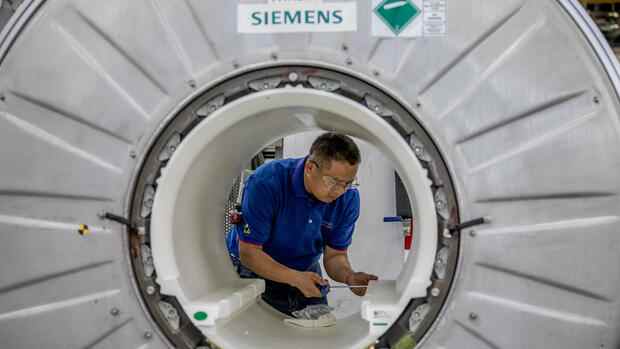China is an important location for Siemens. But if the economic areas of Europe/USA and China drift apart, China will increasingly become a risk for German companies.
(Photo: dpa)
Berlin The traffic light is driving its change of course in dealings with China. The federal government has agreed to limit the multi-billion government investment guarantees for the German economy through comprehensive new rules. This was announced on Thursday from circles of the Federal Ministry of Economics.
The reason for the change of course is the growing dependence of German companies on the Chinese market at a time of increasing geopolitical tensions. The federal government is working intensively on the scenario of a military conflict in Taiwan, which could lead to severe sanctions, which in turn would affect many German companies.
So far it has worked like this: companies invest in emerging and developing countries and are reimbursed by the state for losses caused by political decisions such as a military conflict or expropriation, provided a guarantee has been issued beforehand. The German economy has currently secured around 29 billion euros from the state.
The investment guarantees have so far been granted fairly freely by the federal government and have been extended again and again. Federal Minister of Economics Robert Habeck (Greens) had already indicated in the summer that this should be the end. At that time, his house refused to extend guarantees for Volkswagen on human rights grounds.
Top jobs of the day
Find the best jobs now and
be notified by email.
The automaker has a plant with its Chinese joint venture partner SAIC in the western Chinese province of Xinjiang, where Beijing has been accused of serious human rights abuses. The refusal was a one-time event of this magnitude.
The Chancellery and Ministry of Finance initially had reservations
As a result, Habeck wanted to put all of the investment guarantees on a new footing. The Handelsblatt had already reported on this in August. At that time, however, there were still clear reservations in the SPD-led Federal Chancellery and in the FDP-led Federal Ministry of Finance.
>> Read here: How Economics Minister Habeck initiated the tightening of investment guarantees
But now the Chancellery and the ministries have reached an agreement. The aim is to “better avoid cluster risks in the future,” according to circles in the Ministry of Economic Affairs. What is meant above all is China. A readjustment is needed because “an excessive concentration of secured projects” has occurred.
In the future, companies should only be insured for three billion euros per country in which they are active. The total is reviewed every three years and adjusted if necessary. The Ministry of Economics had already called for such a limit in the summer. Whether the sum of three billion euros that has now been combined will have the effect Habeck wants cannot be answered in general terms. The investment guarantees are usually not published.
The investments that the German economy is making in China as a whole offer a rough comparison: In the first half of 2022 alone, they amounted to around ten billion euros. A record. The chemical giant BASF also recently approved the construction of a second Verbund site in China costing ten billion euros.
And something else is new: the premium for companies that they have to pay annually to the state insurer for the guarantee will be increased. Normally, it is 0.5 percent of the insured amount. In countries where more than 20 percent of the total of 29 billion guaranteed by the federal government is insured, the premium is to rise to 0.55 percent. Around a third of the investment guarantees go to China, so the higher premium would apply there.
Important part in new China strategy
Economics Minister Habeck is thus taking the next step in his China-critical strategy process. In addition to the investment guarantees, he wants to tighten the checks on investments in Germany. It was only on Wednesday that the federal cabinet, at his suggestion, banned the Chinese takeovers of the semiconductor companies Elmos and ERS Electronics. The Ministry of Economics is also planning to reform state support for exports.
The federal government wants to compensate for the more cautious approach to China with new business partners. The keyword is diversification. That is why the traffic light wants to achieve with the restructuring of the investment guarantees that “German companies will be given more support in the future in opening up new markets,” according to circles of the Ministry of Economic Affairs.
>> Read here: Federal government stops further Chinese takeover of German semiconductor company
In the light of the currently difficult geopolitical situation, the aim is to help German companies to implement projects in countries that have not been the focus of the economy so far.
He wants to play the door opener for this at the weekend. Habeck then travels to Singapore for the Asia-Pacific Conference, accompanied by a business delegation.
More: How the traffic light wants to shield critical infrastructure from China

